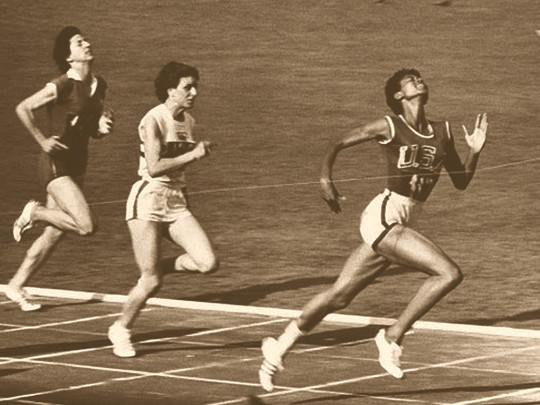#wilma rudolph
Inspirational Quote from Track and Field Legend Wilma Rudolph for #MothersDay (LISTEN)
Inspirational Quote from Track and Field Legend Wilma Rudolph for #MothersDay (LISTEN)
[Wilma Rudolph and her parents Ed and Blanche Rudolph as they rode in a parade after Olympic victory in Rome. Rudolph agreed to participate only if the event was desegregated. This was the first desegregated public event in Clarksville, Tennessee. Photo credit: Bob Ray via https://digital.library.nashville.org/digital/collection/nr/id/2227/]
by Lori Lakin Hutcherson (@lakinhutcherson)
On Mother’s…

We love the Olympics not only for the amazing feats of athleticism on display but also for the personal triumphs over adversity that bring the athletes to the games. Wilma Rudolph is a legend for both. At just age 16, she won a bronze medal in the 1956 Melbourne Olympics and then took home 3 golds four years later in Rome. But even to compete at all was a victory for Rudolph. A sickly child, she survived premature birth, whooping cough, chicken pox, scarlet fever, measles, and infantile paralysis caused by the polio virus. Who knew this girl with a brace on her twisted leg would become the fastest woman in the world and an international star?
Tell your friend she’s got a little Wilma Rudolph in her. Reblog now to give her a little push.
Post link


Wilma Glodean Rudolph (June 23, 1940 – November 12, 1994) was an African-American sprinter born in Tennessee who became a world-record-holding Olympic champion and international sports icon in track and field following her successes in the 1956 and 1960 Olympic games. Rudolph was acclaimed the fastest woman in the world in the 1960s and became the first American woman to win three gold medals in a single Olympic Games.

She overcame polio and debilitating sickness as a child to become the first American woman to win three gold medals in one Olympics. Her record-breaking achievements even earned her the monicker of the “fastest woman in the world.” How’d she do it?
Born 1940 in St. Bethlehem, Tennessee, Rudolph started at a disadvantage. Child 20 of 22 in a large & impoverished family, she contracted infantile paralysis from the polio virus at the age of four. As a result, Rudolph was fitted with a brace for her crippled left leg and foot. Her mother drove 90 miles every week to take her to therapy for years. She was finally able to lose the brace at the age of nine, and although having to wear an orthopedic shoe for 2 years after, eventually became a star basketball player on her school’s team.
It wasn’t long until Ed Temple, Tennessee State coach, took notice. He saw a natural talent and recruited Rudolph to train in his summer program for track and field. At only 16, she earned a spot on the U.S. Olympic track & field team and came home with a bronze medal from the 1956 Melbourne games. She also won a gold medal at the Pan American games in the 4 x 100 m relay in 1959.
In 1960, she continued her winning streak at the summer Olympic games in Rome. She was the first woman to win three gold medals in one Olympics, and broke some records while doing it. Rudolph won the 100 m dash in 11 seconds flat, setting a new world record. However, since the run was “wind-assisted”, the record was not credited as such. She was credited though with setting the Olympic record in the 200 m dash at 23.2 seconds. Rudolph earned a third medal in the 4 x 100 m relay, as well setting another world record at an impressive 44.5 seconds. She was United Press Athlete of the Year in 1960 and Associated Press Woman Athlete of the Year for 1960 and 1961.
Rudolph would retire from competition in 1962, but continued receiving honors. She was inducted into the U.S. Olympic Hall of Fame in 1983, honored with the National Sports Award in 1993, and inducted into the National Women’s Hall of Fame in 1994. She would as a track coach at Indiana’s DePauw University and serve as a U.S. goodwill ambassador to French West Africa.
Rudolph would die of brain cancer at the age of 54 in 1994 in Nashville, Tennessee.
“Winning is great, sure, but if you are really going to do something in life, the secret is learning how to lose. Nobody goes undefeated all the time. If you can pick up after a crushing defeat, and go on to win again, you are going to be a champion someday.”
-Wilma Rudolph
Photo Source: Wikimedia Commons
Source: Wikipedia
Source: ESPN
Source: Biography.com
Source: Olympic.org



